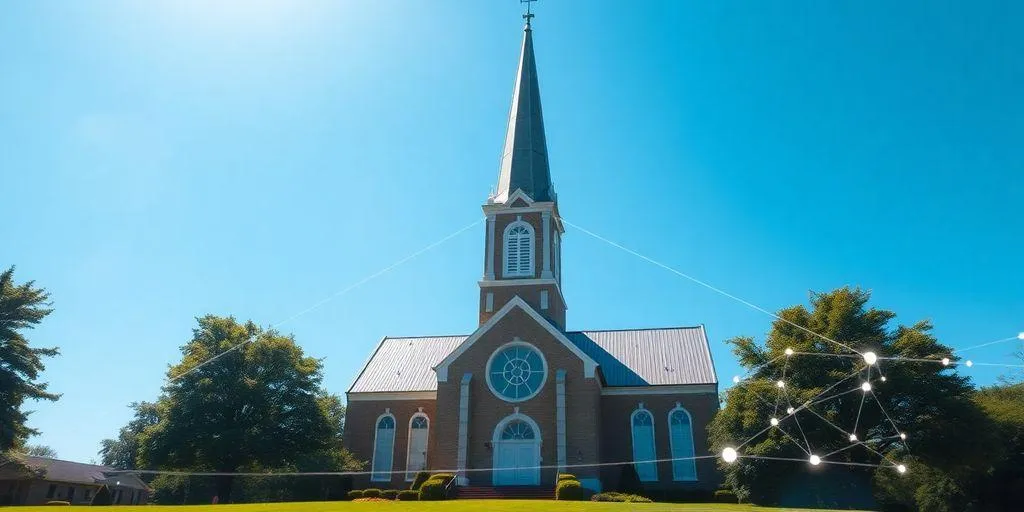
SEO for Your Church The Ultimate Guide
If you want to see more people at your church, it's good to know that most visitors check out your church website before they ever step foot inside. So, it makes sense that if you can get more folks to your website, you might see more first-time visitors. The big question is, how do we get more people to our church website? The answer is church SEO.
Honestly, many churches hardly see any visitors, which can be pretty frustrating. It is clear that if these churches don't get more people through the door, they wouldn't grow or even last much longer. Churches need new people. The path for most first-time visitors seems clear: they hear about you online, visit your website, and then maybe come in person if they like what they see. The problem is, nobody is getting to your website. Most churches are practically invisible online. So churches must decide to take SEO seriously.
SEO stands for Search Engine Optimization. It's about making sure what you do online for your church helps you show up on Google and other search engines when people look for churches in your area. Local church SEO works. It is very possible to go from almost no visitors to seeing five, six, then 14 or 15 visitors every Sunday. As those visitors come in, your church will start to grow. That's why church SEO really matters – it helps get the message out to more people.
SEO for Your Church The Ultimate Guide
Four Types of Church SEO
There are four main ways you can do SEO for your church:
Technical SEO
Local SEO
On-Page SEO
Off-Page SEO
Let's break them down.
Technical SEO
Technical SEO is about making sure your website's technical parts are set up to give it the best chance of showing up in searches. Think of technical SEO as the foundation for all your other SEO efforts. If this part isn't solid, other things won't work as well because Google might lower your ranking.
Some basic things you should always have are an SSL certificate (that little lock icon in your browser) and a sitemap submitted to Google, which you can do through Google Search Console.
But the two biggest things that often cause trouble for churches are site speed and mobile viewing.
Site Speed
Many churches focus a lot on how their website looks, which is important. But these days, how fast your site loads is almost just as important. Pay attention to the size of your videos and images. For example, if staff bio pictures are huge files, they can slow things down. If you use WordPress, a plugin like WP Smush can compress images without making them look bad. Also, those cool background videos? Make sure they are really compressed. Google directly connects your search ranking to how fast your site loads. Ideally, it should load in under 2 seconds. Many church websites take five, six, or even 15 seconds to load, which is too long.
Mobile Friendliness
About 60% of all internet traffic happens on a mobile device, not a desktop. But most people who design websites or write content do it on a desktop, which has a very different screen size. Often, how the site looks on a phone is an afterthought. This goes beyond just how it looks; load times are also different on mobile. You want your website to be super lean and fast on mobile devices. Google has said this is a big ranking factor, so getting your site speed and mobile friendliness right is very important.
Local SEO
For small to medium-sized churches, local SEO offers a big chance. When someone searches for a church, they often type things like "church near me" or "churches in my city." After ads, you'll usually see the Google Map Pack. This is where Google tries to show the most relevant places near the person searching. You want your church to be one of those relevant options.
Key Takeaways
Optimize Your Google Business Profile: This used to be called Google My Business. Google likes it when you give them all the information they ask for. Fill out everything: your church's name, phone number, address, service times, office hours, and even pictures of your building. This is the basic step for showing up in local searches.
Consistent NAP (Name, Address, Phone Number): Make sure your church's name, address, and phone number are written the exact same way everywhere online. If your church is on "Blueberry Street," don't sometimes write "Blueberry St." Google tries to figure out where your church is by looking at all the information online. So, make sure it's consistent on your own site and on every local directory that mentions you. There are many online directories, and getting listed on them all with consistent info can be a lot of work, but it's very important.
Get Reviews: You might wonder why a church needs reviews, but people look at reviews for almost everything before making a decision. Your church probably already has some reviews online, and some might not be great. The best way to fix this and show up more in the map pack is to get more reviews, especially positive ones. Think of reviews as testimonies about the impact God has made through your church. Ask people from your church to leave reviews, starting with your Google Business Profile, then Facebook, Yelp, and Apple Maps. With a little effort, you can see big results and climb the rankings to be a top church Google suggests when people search for "churches near me."
On-Page SEO
On-page SEO is all about the content you put on your website. Most churches want to rank for terms like "church" or "churches." While that's true, it's really hard to rank for single-word terms organically unless you're one of the biggest churches in the country. But there are great chances for even small churches to rank for other keywords.
Instead of single words, focus on what we call long-tail keywords. These are two, three, or even four-word phrases people might search for. For example, if your church wants to rank for "giving in the Psalms," that's much more achievable. Why would your church want to rank for that? Because if you start ranking for more and more keywords that are relevant to people looking for churches or spiritual answers, Google will start to see your site as an authority. This helps you when people search for more general terms that might mean they want to visit a church. The more keywords you rank for, the better your site's overall health will be, and it increases your chances of being shown in all kinds of future searches.
Churches put out sermons every week, which is a lot of content. You should take that video content and make sure you have text content to go with it. You can use AI tools or services like Rev.com to get a transcription of your sermon. Then, you can put that transcription right onto your website. You'll have a lot of written content that matches your sermon. Even better, you can use AI to turn that transcript into a more organized blog post. You can even ask AI for keyword suggestions to make it more SEO-friendly. Doing little things like this consistently will make a big difference in your Google rankings over time.
Another tip: make sure your titles are good. Use the keyword you're targeting at the beginning of your title to have a better chance of showing up in searches. Writing regular blog posts is another great way to create content, but remember, results don't happen overnight; it's a long-term effort.
Off-Page SEO
Off-page SEO is mainly about link building. One of the biggest factors in how your church ranks is how many links point to your site and how important those linking sites are. Simply put, if many websites link to your church's site, you'll rank higher when people search for church and faith-related topics. So, it's important to find ways to get other site owners to link to your church's website.
Strategies for Link Building
Create Great Content: If you have a really good sermon or blog post that people like, they will naturally start to share it and link to it. This is the most natural way to build links. Put effort into the content you create, and over time, you'll get links.
Use Stats: People love to share statistics. When you quote a stat, you usually have to share your source. By sharing your source, people might link back to your church's website. Include stats in your blog posts or sermon notes.
Outreach and Partnerships: Churches often have a good reputation in their community. There are likely other organizations that would be happy to link to you. Think about partnerships your church has, like with a local homeless mission or a Christian school you support. These are great sites that can provide valuable links. Maybe members of your church have websites and could link to you. If your pastor speaks at another church, make sure they link back to your church when they post the sermon on their site. You can also offer to review products or services that your church uses. For example, if you talk about the impact a local food bank has had, they might quote you and link back to your church's website.
A big warning: Do not get involved with schemes where you pay for links to your church. While some services might write guest posts for you on other blogs to get links, most cheap offers are what's called "black hat" techniques. If Google catches you doing this, you could face a huge penalty that your church might never recover from. You're looking for organic, natural links that make sense from organizations similar to yours, not just trying to get as many random links as possible. Avoid offers that promise hundreds of links for a low price; they will cost your church dearly in the long run.
I hope this overview of church SEO has been helpful. Getting started with SEO can really help your church reach more people.



